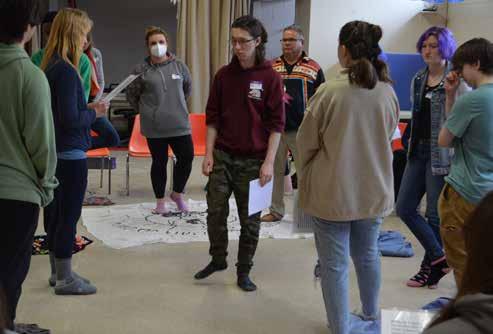
4 minute read
Curious about Cursillo?
Cursillo (pronounced Ker-see-oh) You may or may not have heard of it, but what is it?
BY SHARRON HAMILTON
Advertisement
Cursillo (in Spanish: Cursillos de Cristiandad, short course in Christianity) is a ministry that began in Spain in the late 1940s. It was after the war, and the people seemed to be drifting away from their churches. A group of committed Roman Catholics decided to make a pilgrimage to the shrine of St. James at Compostela and pray about the situation. They came home with the idea of Cursillo. The first three-day weekend was held in 1949 on the island of Mallorca. Over the years, it expanded worldwide and in 1981, with a great deal of support from our Roman Catholic brothers and sisters, and with the blessing of our bishop, the Ottawa Anglican Cursillo Movement (OACM) was born. The weekends were organized around talks, but were primarily conceived as workshops in which the truth of Christian faith could be proclaimed out of lived experience and upon which apostolic action could be modeled.
Cursillo, a short course in Christianity — the use of the word ‘course’ may be a bit misleading. There is no standard to attain, no exams, no report card, no tests. Everyone simply experiences their own Cursillo journey. It is really an experience in Christianity—the opportunity to experience living together in Christian community, feeling God’s love for us, and learning about sharing that love with others.
There are three parts to the Cursillo method.
Pre-Cursillo, which is a time of prayer. The community is praying about who should attend a Cursillo weekend and when would be the right time to introduce potential candidates to the Cursillo method. Cursillo is not for everyone, and so it is very important to pray about who to ask and ask God if this is the right time for that person to attend a weekend. Prospective participants may be approached by someone who is already part of Cursillo, or they may decide on their own that they are interested in attending a weekend. Either way, everyone who attends a Cursillo weekend has a sponsor, someone who has been on a weekend and remains active in Cursillo. To sponsor a friend on a Cursillo weekend is to give that person a beautiful gift of an uplifting weekend.
The Cursillo Weekend — What to expect on a weekend? The weekend starts on Friday at noon and ends late on Sunday afternoon. On the weekend, talks, called Rollos, are given by laity and clergy covering the basics of Christianity. The Rollos discuss what it means to be a Christian and about the very real need to be with others while growing and witnessing in faith, as well as the unique means by which this can be carried out through the Cursillo Method. A weekend also consists of morning and evening prayer and other spiritual exercises; quiet time; prayer time; and time together in community. Laughter and music are also part of a Cursillo weekend. It is an opportunity to break away from the day to day very busy schedules to take time for oneself and to experience God.
Cursillo is for all those who want to look seriously at themselves and their lives, their relationship with others and with God.

The Cursillo weekend is unique for each person. Although everyone is together in the same room, listening to the same speakers and participating in the same liturgies, each will have a unique experience, depending on their own background, their openness to Christ and their responses to Him. To experience a weekend, it is helpful to just live in the moment, to be receptive to Christ’s love in what you hear and see around you. This will take patience and trust.
Fourth Day — follows the three-day weekend and is the support system for the rest of our lives to continue our faith journey. To help us in our fourth day, there are Ultreyas and Group Reunion. Ultreyas (Spanish meaning onward) are held frequently within the Diocese of Ottawa, and they follow the pattern of a Eucharistic service with a witness talk. After the witness talk, those attending break out into groups to discuss what they have heard. Ultreyas are a chance to come together, greet old and new friends, worship and share life experiences. Here people can share, sing, and pray together so that they may be lifted up and strengthened in their ministries.
Group Reunions—after attending a Cursillo weekend, one is encouraged to form a group reunion with a few close friends for mutual support and encouragement in one’s walk with Christ. Group reunions meet on a regular basis to share with one another the growth that has taken place within each member.
Cursillo is a world-wide movement in more than 60 countries. The Ottawa Anglican Cursillo Movement is a worshipping community and it functions as a ministry of the Anglican Diocese of Ottawa and operates under the direct authority of the Bishop of Ottawa, the Right Reverend Shane Parker. The OACM is an ecumenical organization that welcomes members from other Christian faith organizations than Anglican. We have members that worship in the United Church, the Lutheran Church and several other Christian denominations.
The administrative responsibilities of Cursillo are carried out by the Secretariat, a committee of lay people and clergy. A network of parish representatives carries out the work of Cursillo locally, and events are organized by groups of committed volunteers. Cursillo is governed by its constitution and by-laws, and major decisions are confirmed by the community at its Annual General Meeting.
Cursillo has no secrets. All gatherings and events are open to anyone who is interested in attending.
There are two Cursillo weekends planned in the next year.
129th Women’s Cursillo Weekend — Sept. 22 – 24, 2023
130th Men’s Cursillo Weekend
— Exact dates are not yet decided at this time, but planning is underway for April 2024.
If you want to learn more you can • visit https://oacm.ca/wp/ • speak to your Parish Cursillo Representative or to your Parish Priest.
Sharron Hamilton is Assistant Lay Director, Ottawa Anglican Cursillo Movement assistant.lay.director@ oacm.ca hope that her own presence in classrooms will be an inspiration to others. Bouzi described the racism she has faced in the workplace. When her union dismissed the discrimination she brought to them, she built her own case and won. In 2020, Bouzi was elected by her peers to the role of President of OPSEU Local 415, the faculty union at Algonquin College.
Bouzi- said she finds inspiration in her mother’s courage in never being afraid to speak truth to power.
Austin Ward is a Métis First Nations man who was homeless and street-involved until he was 25. He spoke of the racism he faced growing up in Winnipeg and the pressure he felt to hide or deny the fact that his father was Indigenous. He also shared the story of his journey to attend and graduate from Algonquin College and the career he has built helping others. currently Working as a BIPOC practice facilitator, he currently supervises an interdisciplinary team called the Drug Overdose Prevention and Response Unit where he is an acting manager.









